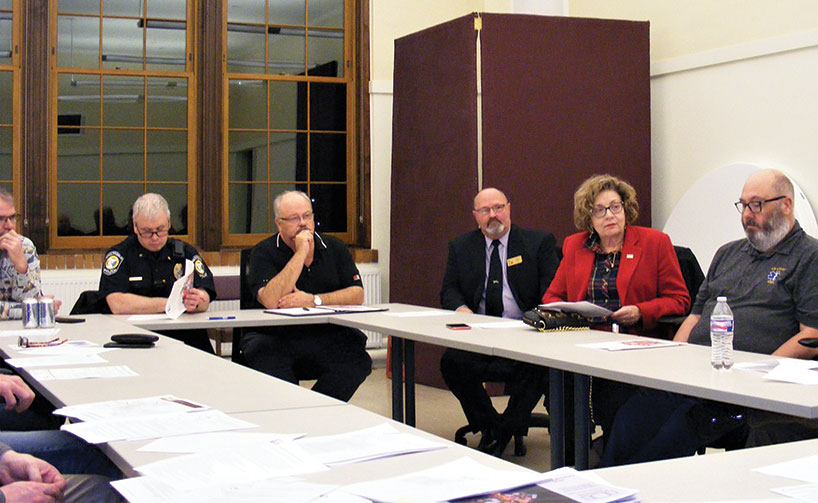
Photo by Karen Reisner
Representatives of the City of Chatfield and Chatfield schools pointed out both needs and wants to state legislators to be considered in the upcoming 2023 legislative session. Representative Greg Davids and Senator Carla Nelson shared their comments on a variety of issues at the November 22 meeting.
Mayor Russ Smith opened the meeting. Soon-to-be mayor John McBroom along with members of the city council and city staff were seated at the table. Superintendent of Chatfield Public Schools Ed Harris, Elementary Principal Shane McBroom and school board chairman Lanny Isensee represented school interests.
Nelson praised the TIF proposal put forth by the city last session. The proposal called for the 15,000-square-foot limit to only apply to the first floor of a building. She said it was well reasoned and needed. EDA Director Chris Giesen said developers for the proposed hotel are asking if it will pass. Nelson acknowledged that the process would need to start over with the new legislature, but she hoped it will go through in a Tax Bill. Davids said he could get it drafted for the House.
Davids said he has been pushing for a special session for a bonding bill. Nelson added there may be potential for a special session in mid-December, for bonding only. If it does occur, Davids suggested the bonding will be heavy on infrastructure. The upcoming 2023 session is a budget year and both the House and Senate will be led by the Democratic party.
Harris said expenses for schools are accelerating faster than usual. Staffing is an issue. Deficit spending is more acute. Nelson said there still are some COVID relief funds. She acknowledged that learning loss (children not caught up to age level expectations) due to the pandemic will linger longer. There are also mental health needs. Harris noted some funds are locked up due to use regulations. Principal McBroom said the pool of teachers started to diminish before COVID. It is very challenging; two positions are open now.
Isensee said he is also a business owner (Southeast Mechanical). “Businesses are struggling to get people too. Kids need to walk out of school and be able to go to work for people like me.” He maintained a college education is forced too much, as there is money in jobs where kids are trained for a specific skill. Nelson suggested it may have been better if vocational-technical schools had merged with high schools.
Councilor Paul Novotny said it comes down to funding. There used to be multiple classes where kids learned about hands-on skills. Isensee added we need to open their eyes (students) to these possible work opportunities, as some may find they have a calling to build something with their hands.
Principal McBroom noted there is a difficulty in getting staff for this kind of teaching. People would have to be willing to leave their field (like construction) to teach, where they would make less.
Davids asked what fully funded education is, how much is enough. The Minnesota School Boards Association legislative platform requests the increase of the basic education formula by 5% each year indexed to inflation. He expressed his concern regarding the upcoming session. With one party control there will be pressure to spend the $10 billion surplus. There has to be balance; some should go back to the taxpayer. He acknowledged it is the state’s responsibility to fund education. He insisted if the budget is raised for one year, it will have to be raised the next year and the next. There will be no stopping the spending train; we will not recognize the state in two years.
Giesen, EDA, expressed his priorities: create more affordable housing and build the hotel. A positive market study has been done for the hotel. For these ends the city has looked at extending Burr Oak Ave. and making improvements on Division St. The hotel is contingent on the alteration of TIF law.
Novotny asked what affordable housing is. “We have kicked the can down the road when it comes to streets in order to keep taxes down. We don’t have enough money to take care of the streets we already have.”
City Clerk Joel Young noted the city’s legislative priorities, which include the funding of Local Government Aid, the Small Cities Assistance Fund, and the expansion of the Local Road Improvement Program to aid a Burr Oak Ave. extension and Division St. improvements. The reintroduction of a bill for the creation of a Small City TIF exception is needed to help make major projects (50-plus room hotel) possible. The bill would modify the small cities exception such that the 15,000-square-foot restriction applies only to the ground floor. Affordable housing is essential. Infrastructure costs, cost and availability of materials and labor are ongoing issues. The city has property that could accommodate more than 150 single family homes.
Chatfield Ambulance Director Rocky Burnett insisted EMS services are not just a local issue. Speaking to the legislators, “We need your help.” More financial incentives are needed for EMTs; he pointed to the incentives that are in place for the fire department.
Police Chief Shane Fox said it is difficult to hire people. People are leaving law enforcement in droves. He said officers must intervene on behalf of someone but can be charged criminally for interceding. Fox said, “Police are well supported in this community, but statewide it scares me. Nelson admitted it is an area to be concerned about in the coming legislative session.
Appreciation Event
After the meeting with legislators, community members gathered to socialize and to celebrate those who serve Chatfield at the 2022 Appreciation Event.


Leave a Reply